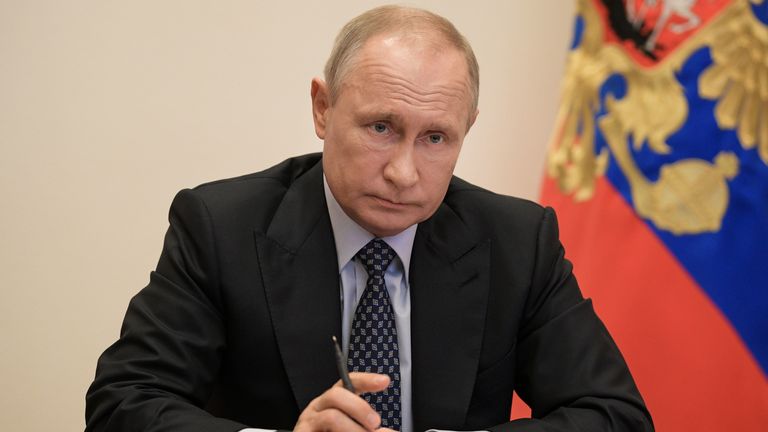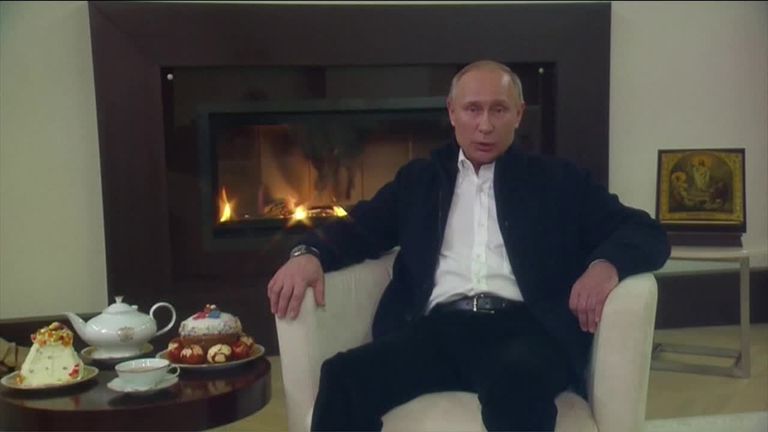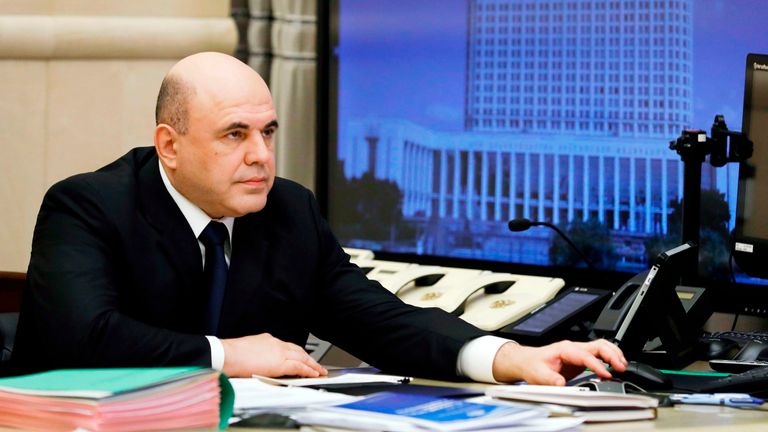Coronavirus: Why Putin's situation is becoming increasingly precarious
A confirmed infection at the top of government deals a blow to the leader's attempts to portray the situation as under control.
Friday 1 May 2020 04:56, UK
Long a global outlier in terms of numbers, now even Russia's Prime Minister Mikhail Mishustin has tested positive for COVID-19.
According to the TASS news agency, he informed Vladimir Putin of his coronavirus test results during a video conference.
"The government will continue to work as usual," he said.
"I plan to be in active contact by phone and video on all major issues. As the interim, I propose the candidacy of [First Deputy Prime Minister] Andrei Removich Belousov."
It comes as the number of cases in Russia passes the grim milestone of 100,000. In the virus's global rankings, the largest country on earth is now the eighth most infected, with more cases than China and Iran.
But it still ranks low in terms of mortality, with just over 1,000 deaths.
Given the Kremlin's reputation for mendacity, it requires some faith to take that death toll at face value.
That would point to a remarkable efficacy both of testing and treatment that anecdotal evidence from inside Russian hospitals, especially in the regions outside Moscow, would suggest is not the case.
Take the city of Ufa, 840 miles east of Moscow. Medics from the main hospital there made a video appeal to Mr Putin this week demanding a full investigation into how their hospital was able to become a regional ground zero for COVID-19.
They say they believe the local authorities knew in March they had a problem but that they failed to act on lab test results.
"We do not believe the data from labs controlled by the (regional) authorities," they say.
:: Listen to the Daily podcast on Apple Podcasts, Google Podcasts, Spotify, Spreaker
On 6 April their hospital was put under a two-week quarantine. Medical staff were sealed in with what they say was insufficient protective gear and nowhere to sleep, with many of them continuing to work when sick.
It is a similar story in other Russian regions. Hospital departments or entire hospitals shut down to prevent the virus from escaping, with those inside terrified they are trapped in a human incubator.
"We are all mothers, we want to leave here alive," say a group of patients in a video plea from a hospital in the northern Komi republic.
Another video from the main infectious diseases clinic in the southern city of Maykop shows the dire state of infection control in some Russian regions.
Pots brimming with faeces sit beneath hospital beds, waiting to be emptied. There is no toilet seat in the bathroom. The bed linen does not look clean.
"The floor is from Stalin's time. It hasn't been washed since then," says a voice from behind the camera.
It is a very different picture from the glossy new units Moscow's Mayor Sergey Sobyanin flashes on his Twitter feed.
Moscow has scrambled to increase its hospital bed capacity, currently at around 20,000, with 7,000 more in the offing as the virus continues to spread despite more than a month in lockdown.
It is still the epicentre of the outbreak but your chances of high-quality medical care are undoubtedly best in the capital.
But even here, the clamour for PPE is loud. Exhausted hospital staff are in desperate need of reinforcements. First year medical students are being drafted in to help and there are suggestions it is not voluntary.
"We all have a choice, it's not compulsory, though for the older students it's hard for them to refuse," says one first year student from Moscow's Sechenov University.
A sixth-year student from the same university put it more bluntly, saying: "We were told by the heads that we're not forced to work in the red zone, but I don't know how it'll be in reality. You can't refuse this."
Mr Putin told the nation on Wednesday that the peak was yet to come and that the traditional May holiday period would all be under lockdown.
It's not the terminology he uses, he still prefers to call these "non-working days", as though he doesn't want to be seen to be the one inflicting a tough self-isolation regime on his people.
But a positive result for COVID-19 at the very top of government deals a blow to Mr Putin's attempts to portray the situation as under control.
He has already had to postpone two projects he holds dear - a vote on constitutional amendments which would have paved the way for him to stay as president beyond 2024, and the 75th anniversary of the Soviet defeat over Nazi Germany, which should have taken place on 9 May.
The catastrophic collapse in the oil price too is eating away at Russia's rainy day reserves and will leave him in an increasingly precarious situation economically. For a while during this pandemic, Mr Putin was sitting pretty.
That time is over.






